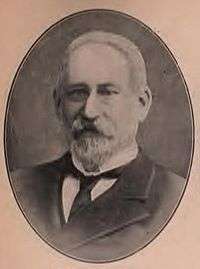Frederick Dixon-Hartland

Sir Frederick Dixon Dixon-Hartland, 1st Baronet DL FRGS (1 May 1832 – 15 November 1909) was an antiquary, banker and a Conservative politician who sat in the House of Commons from 1881 to 1909.
Hartland was born in a small rural village, Charlton Kings, Gloucestershire, or close to Evesham, Worcestershire the son of Nathaniel Hartland and his wife Eliza Dixon of dissenting Christian sects, termed at the time nonconformists.[1] He was educated at nearby Cheltenham College and in London at Clapham Grammar School.[2] Hartland was a traveller — he published Tapographia; or a collection of tombs of royal and distinguished families, collected during a tour of Europe. He was elected Fellow of the Society of Antiquaries and a Fellow of the Royal Geographical Society in 1854.[3]
In 1875, he purchased land at Middleton-on-Sea and Felpham in Sussex[4] in addition to his other home and agricultural holding at the time The Oaklands, Charlton Kings.
In business, he was a partner in Woodbridge Lace & Co and the Uxbridge Old Bank, a bank of a main historic market town in Middlesex, an abolished county centred on western and central London. In 1891, he sold the Smithfield Bank to Birmingham and Midland Bank [5]
Dixon Hartland stood unsuccessfully at Hereford in 1880, but was elected as MP for Evesham in 1881. He donated chancel gates and screens to the church of St Mary's at nearby Cheltenham.[6] In 1885 he stood at Uxbridge with the same party and held the seat until his death in 1909. He was a Conservative.
Dixon Hartland was a County Alderman for Middlesex in 1889, a Deputy Lieutenant for the City of London, and a justice of the peace for Gloucestershire, Worcestershire and Middlesex. He was created a baronet in 1892 and adopted the prefix Dixon to his surname.
In 1895 he was appointed Chairman of the Thames Conservancy.[7] Dixon-Hartland was the first president of Fulwell Golf club in 1904, which sat on a south-eastern border of his constituency.[8] He married his second wife, 28 years his junior, in 1895 Agnes Chichester Christie. His latter life London home was at Chesham Place, Belgravia/Knightsbridge,[9] when not living at his Sussex home, the district in which his death was registered. An obituary was published in a Hull newspaper stating his death was in London.
References
- ↑ 1 May 1832, England and Wales Non-Conformist Record Indexes (RG4-8), 1588-1977: birth of Frederick Dixen [sic] Hartland to Nathaniel and Eliza Hartland, in Worcestershire.
- ↑ William Retlaw Williams The Parliamentary History of the County of Worcester 2008
- ↑ William Retlaw Williams The Parliamentary History of the County of Worcester 2008
- ↑ Middleton-on-Sea, A History of the County of Sussex: Volume 5 Part 1: Arundel Rape: south-western part, including Arundel (1997), pp. 190–204. Date accessed: 12 December 2008
- ↑ Judy Slinn Clifford Chance: Its Origins and Development Production Consultants plc, 1993 ISBN 0-906782-98-8
- ↑ St Mary's Church History
- ↑ William Retlaw Williams The Parliamentary History of the County of Worcester 2008
- ↑ Fulwell Golf Club History. The course adjoins Teddington which was until 1918 in the Uxbridge constituency, which also adjoined the River Thames until that date.
- ↑ Such as at the 1901 census and in the 1895-1909 annual London Electoral Rolls as Frederick Dixon Dixon-Hartland (and in some cases Bart. M P (baronet, member of Parliament).
External links
- Hansard 1803–2005: contributions in Parliament by Sir Frederick Dixon-Hartland
| Parliament of the United Kingdom | ||
|---|---|---|
| Preceded by Frederick Lehmann |
Member of Parliament for Evesham 1881–1885 |
Succeeded by Sir Richard Temple |
| New constituency | Member of Parliament for Uxbridge 1885–1909 |
Succeeded by Charles Mills |
| Party political offices | ||
| Preceded by Sir Albert Rollit |
Chairman of the National Union of Conservative and Constitutional Associations 1890 |
Succeeded by Henry Byron Reed |